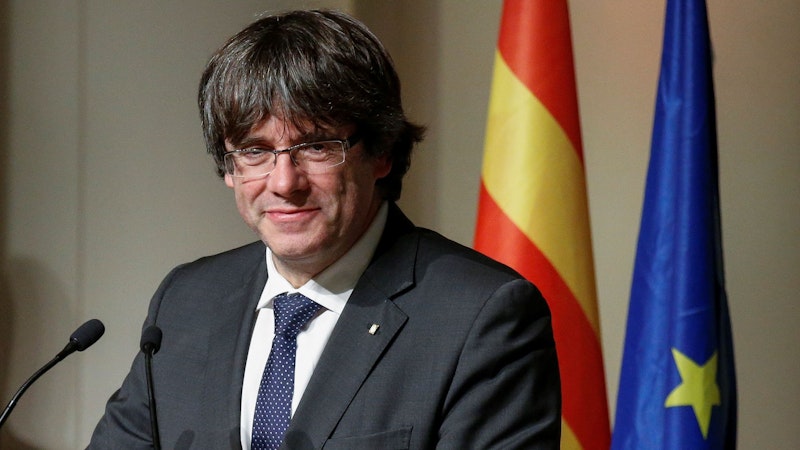Since 2017, Carles Puigdemont, the former president of Catalonia (we'd call him the governor) and five members of his cabinet have lived on the lam in Belgium and elsewhere, accused of various crimes by the Spanish government. Nine others have been sentenced to prison. The crime for which they’ve been convicted is calling a vote and abiding by its results. Making that a felony seems puzzling in a nominal democracy.
But now it seems that the hundreds of Catalan separatists accused or convicted of crimes will receive a general amnesty, as Socialist Party leader Pedro Sánchez needed the support of separatist parties to cobble together a governing coalition. This in turn has led to massive protests, as hundreds of thousands march against the amnesty.
The coverage of these developments in the American media has been notably hostile to Sánchez, and also notably puzzling and anti-democratic. Here is a bit from The New York Times:
To cut the deal, Mr. Sánchez had to break his word—something his critics say he has no problem doing—and extend amnesties to hundreds of Catalan separatists who had staged an illegal referendum in 2017 for independence. First among them is Carles Puigdemont, the leader of the independence movement, who has lived for years in exile in Brussels. His Together for Catalonia party, known as Junts, has just seven seats in Parliament, but Mr. Sánchez desperately needs them to govern, giving Mr. Puigdemont outsized leverage.
That kingmaker role for Mr. Puigdemont infuriates many Spanish voters, and not just nationalists or conservatives. They view him as a criminal who brought Spanish unity to the brink of collapse in 2017.
“Puigdemont to Prison,” the demonstrators in Madrid chanted. “Sánchez to Prison.”
Independence movements, including the Basques in Spain and the Kurds in Turkey—though perhaps not the movement to re-brand eastern Washington as the State of Liberty—have occasionally featured terrifying acts of violence, if also often the just claims of oppressed peoples. But Puigdemont and the dozens or hundreds of others accused of crimes in Spain are another matter. He's in exile, and thousands of people are chanting for his imprisonment still, on the grounds that he called an election (which apparently ran 90% pro-independence).
I think I read those words—"illegal referendum"—over and over for a period of years before it occurred to me to wonder whether calling elections can plausibly be the sort of felony that sends your sorry ass to prison. In Spain, it appears from every news account, calling a referendum, ballot initiative, or, you know, vote, is a very serious crime. One might gently point out that modern democracy rests on voting and that all democracy purports to govern in virtue of the popular will, which is what gives the government whatever legitimacy it may enjoy. Democracy, at least in ideology, rests on the consent of the governed and hence on a "social contract."
If 90 percent of the people don't want to be governed by the current government, it has no legitimacy by that standard, i.e. the standard of democracy. If a national government starts arresting people who point that out or prove it, or starts imprisoning and exiling people for calling elections and voting, it’s not a democracy. I'm surprised that I have to say that.
Evidently, the phrase "illegal referendum" makes sense to all sorts or people, and they regard things like referenda, i.e. democratic things, as monstrous crimes. Which is worse, embezzling taxpayer funds for the purpose of concealing your illicit affair, let's say, or… holding elections? It's hard to tell. But fortunately we can toss the embezzlers and the practitioners of democracy into the same hoosegow. "You are charged with asking what people think. How do you plead?"
Right now, "democracy itself is under threat" is the favored trope. It's Trump's fault. Social media is devouring truth. Disinformation and misinformation rule. People don't trust authority anymore. But before we defend democracy by shutting down X or monitoring all communications, we probably ought to pass a series of laws making it completely clear that voting isn’t illegal.
Conservative Alberto Núñez Feijóo, leader of the People's Party, is one of many who has called for a European Union investigation and intervention in the amnesty plan. "He noted that the EU had intervened in the past when democratic norms and the rule of law had come under scrutiny in other member states. 'It’s done so in Poland, in Romania and in Hungary, and we think our case isn’t radically different to those of those countries.'" To repeat, what challenges democratic norms and the rule of law right now in Spain is holding elections.
But each of the EU member states has an interest in making sure that none of its regions separate, and each probably does have at least a few separatists, so perhaps the appeal to the EU to intervene won't fall on deaf ears. They'll crush the popular will here and there, and arrest people for participating in elections, in the name of preserving democratic norms.
If they worked at it for a while, I bet they could get more coherent.
—Follow Crispin Sartwell on X: @CrispinSartwell

